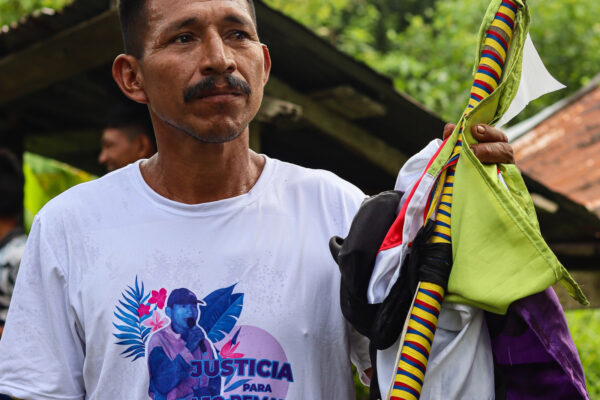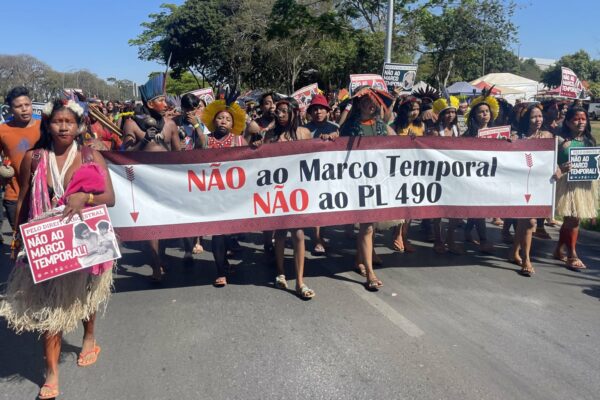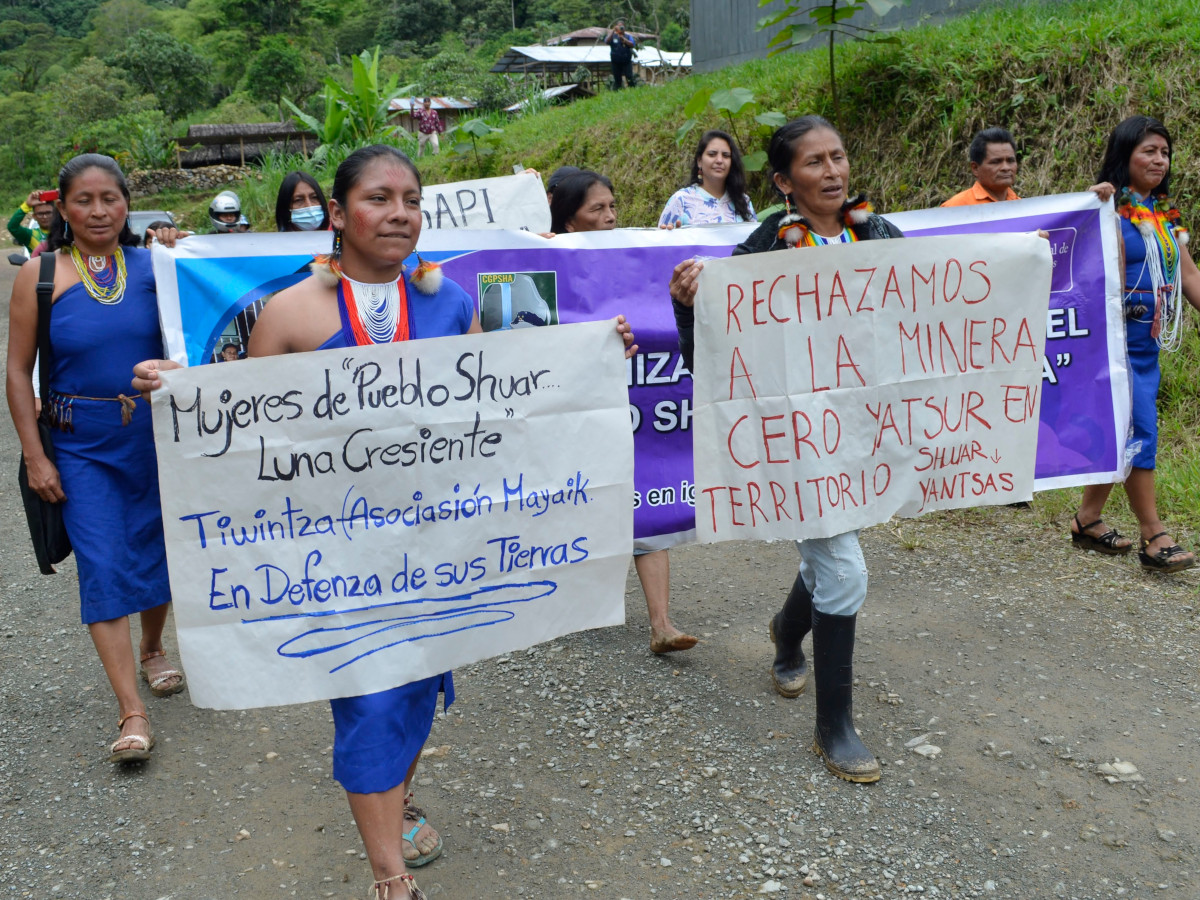Quito, Ecuador – Canada-based junior mining company Solaris Resources Inc. faces renewed opposition from Indigenous peoples to its flagship copper project in the Ecuadorian Amazon, in advance of the company’s Annual General Meeting, to be held Friday, June 23, 2023, in Vancouver, BC. The Shuar Arutam people (PSHA) are warning investors that the company is assuming increased financial, social, and environmental risks by continuing the proposed Warintza Project despite the PSHA’s public rejection of mining on their lands.
In a public declaration last month, the newly elected leadership of the Shuar Arutam people rejected all mining activities on their territory – including that by Solaris – and denounced rights violations from projects and concessions granted for their territory without their consent.
“Fifty-seven percent of our territory is concessioned for mining activities, which affects importance resources for us–water, trees, rainforest, and scenic areas for tourism,” explains Jaime Palomino, President of PSHA. “As Shuar, we live in a permanent relationship with these elements. But the government, without consultation, and disregarding our rights guaranteed by the constitution, auctioned off our territories. These concessions favor transnational companies, not Ecuadorian citizens, and certainly not Shuar families. In our world, as Shuar, mining is death. It is poison.”
“Warintza is a territory of the Shuar nationality,” said Confederación de Nacionalidades Indígenas del Ecuador (CONAIE) President Leonidas Iza. “Did the government conduct a process of consultation in the exploration process? No. Therefore, the entire process that is called “legal” mining is a process tainted with illegality. All mining in Ecuador is illegal because they have not respected the Constitution where the state is obliged to guarantee free and informed prior consultation. Mining “development” is a myth. It is ravaging communities and Ecuador’s unique ecosystems. People have had enough. We are putting companies and investors on notice that they are not welcome in our territories, and we defend our rights.”
Anti-mining sentiment is on the rise in Ecuador. Affected communities along with national Indigenous and campesino organizations took to the streets earlier this month in widespread anti-mining protests. The organizations also filed a constitutional challenge to Executive Decree 754 recently issued by President Guillermo Lasso which attempts to regulate the right to prior consultation of Indigenous peoples for the approval and implementation of extractive projects. Lasso had agreed to not tender or grant any new extractive projects until a consultation law was issued after June 2022 strikes by Indigenous peoples. However, articles 132 and 133 of the Ecuadorian Constitution states that rights must be regulated by law and not by another type of regulation, such as a decree.
In May, Lasso was forced to dissolve Congress and call for new elections amid an impeachment trial, and must now govern by executive decree until snap elections on August 20. The ballot will also include a referendum measure that would prohibit mining in the Pichincha province, which incorporates the capital city of Quito and surrounding areas. If successful, it would be the second referendum to outlaw new mining projects on the provincial level. Meanwhile, court decisions have paralyzed key projects in Los Cedros, Rio Blanco, and Loma Largo, among others.
“Shareholders need to know that the Warintza project is riddled with risk. Solaris is misleading investors and the public on the reality of its social license to operate–or lack thereof,” said Kevin Koenig, Climate, Energy, and Extractive Industry Director at Amazon Watch. And President Lasso’s hail mary attempts to push through business-friendly reforms that undermine Indigenous rights and stand little chance at surviving in court only exacerbate tensions with local communities, and increase project risk.”
The mining sector continues to portray itself as part of the climate solution and energy transition, but the industry is taking a devastating toll on the Amazon biome – a region essential for climate stability – and its inhabitants who depend on it for daily survival. Deforestation, contamination of soil, air, and water, diversion of water resources, erosion, biodiversity loss, and irreversible impacts on the culture and autonomy of Indigenous peoples are just some of the effects of mining activity that are escalating across the Amazon. State-sanctioned mining concessions are also a gateway for wildcat mining and other illegal economies that are rapidly becoming the largest source of deforestation and a driver of violence and conflict against environmental defenders.
Background
Solaris Resources Inc. is conducting controversial exploratory copper mining in a 10,000-hectare concession in Ecuador’s southeastern Amazon in a unique and fragile Andean-Amazon corridor known as the Cordillera del Cóndor, a biodiversity hotspot known for its rare and endemic species. The “Warintza Project,” as it is known, falls on the ancestral and titled territory of PSHA which number roughly 12,000 people. They are organized into 47 communities and hold collective land title to 232,533 hectares of rainforest, and are represented by their autonomous traditional government.
The PSHA have historically rejected mining operations on their territory and Solaris’ controversial efforts to move the project forward without consultation or consent have set the stage for conflict that puts the company’s signature project at risk. Many of the environmental, social, legal, and political risks associated with the project and investing in Solaris were highlighted in a recent report released at the 2023 Prospectors and Developers Association of Canada in Toronto.
Solaris has touted the Warintza Project as a new model for working with local affected communities. But the company has used divide and conquer tactics to manufacture consent for the project, cherry-picking two of the 47 communities directly affected, supplying financial incentives, and touting this limited local support as stakeholder buy-in for the whole project, while failing to have obtained the consent of the PSHA.













